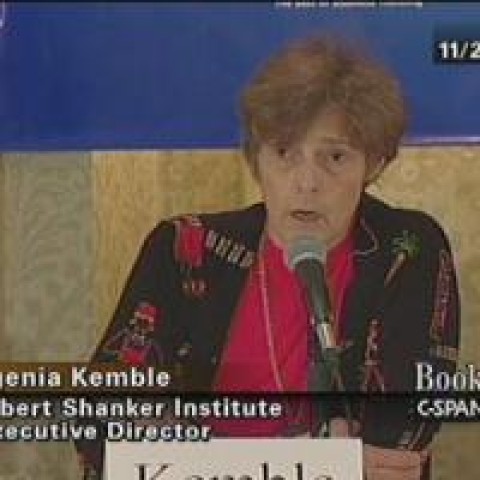Eugenia Kemble

Eugenia Kemble is the Founding Executive Director of the Albert Shanker Institute, a non-profit organization endowed by the American Federation of Teachers and dedicated to publishing reports and fostering candid exchange on education, labor, and democracy issues. Its Shankerblog has become central to these efforts.The Institute was launched in 1998, with the support of the AFT’s late President, Sandra Feldman, as a result of Kemble’s staff work. Beginning as a reporter for the newspaper of the United Federation of Teachers, the AFT’s New York City local, Kemble moved to the American Federation of Teachers as special assistant to Albert Shanker when he was first elected as AFT president in 1974. While in this position she obtained funding to create the union’s main professional development effort for teachers, the Education Research and Dissemination Program (ER&D) and to start the AFT’s professional magazine, The American Educator, both of which she managed for a number of years. She also revamped the AFT’s annual Quality Educational Standards in Teaching (QuEST) conference and helped Mr. Shanker spearhead the creation of the union’s Educational Issues, Research and International Affairs Departments.
In 1983, Kemble was named as the AFL-CIO’s representative to the Democracy Program, a coalition effort including the Republican Party, Democratic Party, U.S. Chambers of Commerce, and AFL-CIO, that recommended the establishment of the National Endowment for Democracy (NED), a non-profit, Congressionally-funded organization that supports the development of unions, chambers of commerce, political parties and civil society organizations around the world, especially in countries where there are significant efforts to create or preserve struggling political democracies. In 1984 Ms. Kemble was named the Executive Director of the AFL-CIO’s Free Trade Union Institute, which supported union efforts involved in democracy building, most notably Solidarity in Poland. Returning to the AFT in 1989, she directed and helped to expand the AFT’s Educational Issues Department and it soon became one of the largest, most influential departments in the union.
